- Home
- Ransom Riggs
A Map of Days Page 3
A Map of Days Read online
Page 3
“Ahh, balderclap,” said Millard. “Does it bother anyone else?”
All the girls raised their hands.
Millard sighed. “Well, then. I shall endeavor to be fully dressed at all times, lest anyone be made uncomfortable by basic facts of biology.”
* * *
• • •
We talked and talked. There was so much to catch up on. We slipped back into easy familiarity so quickly that it felt like we’d only been apart a few days, but it had been almost six weeks. A lot had happened in that time—to them, anyway—though I’d gotten only occasional updates in the letters Emma sent. They took turns describing adventures they’d had exploring peculiar places via the Panloopticon—though only loops that had been pre-scouted and deemed safe by the ymbrynes, since it was not well-known what lay waiting behind all of the Panloopticon’s doors.
They had visited a loop in ancient Mongolia and watched a peculiar shepherd speak the language of sheep, tending his flock without a stick or a dog, just the sound of his own voice. Olive’s favorite had been a trip to a loop in the Atlas Mountains of North Africa, where in a certain little town every peculiar could float just like she did. They had strung nets everywhere above the town so the people could go about their days without weighing themselves down, and they bounced from place to place like acrobats in zero gravity. There was a loop in Amazonia, too, that had become a popular place to visit: a fantastic city in the jungle made from trees, the roots and branches all knotted together to form roads and bridges and houses. The peculiars there could manipulate plants much the way Fiona did—which Hugh had found so distressing and overwhelming that he had scurried out of the loop and back to Devil’s Acre almost immediately.
“It was hot and the insects were terrible,” said Millard, “but the locals were exceedingly nice, and they showed us how they make fantastic medicines from plants.”
“And they go fishing with a special poison that stuns the fish, but doesn’t kill them,” said Emma, “so they can just scoop the ones they want out of the water. Absolutely brilliant.”
“We did some other trips, too,” Bronwyn said. “Em, show Jacob your snaps!”
Emma hopped up from the couch beside me and ran to retrieve them from her luggage. She returned a minute later with the photos in her hand, and we gathered around a floor lamp’s glow to look at them.
“I only recently started taking pictures, and I still don’t really know what I’m doing . . .”
“Don’t be so modest,” I said. “You sent some of your photos along with your letters, and they were great.”
“Eek, I forgot about that.”
Emma was anything but boastful, but neither was she afraid to trumpet her achievements when it came to things she did well. So the fact that she was shy about her photos meant she had high standards and aspired to live up to them. Lucky for both of us—since I have a hard time faking enthusiasm—she was a natural talent. But while the composition and exposure and all that were nice (not that I’m an expert), it was the subject matter that really made them interesting—and terrible.
The first photo showed a dozen or so Victorians posing, casual as picnic-goers, on the crazily slanted roofs of houses that looked like they’d been smashed by an angry giant.
“An earthquake in Chile,” Emma explained. “Printed on non-archival paper that aged badly after we left Devil’s Acre, unfortunately.”
She flipped to the next picture: a train that had jumped its tracks and tipped over sideways. There were children—peculiar ones, presumably—sitting and standing all around it, smiling like they were having a grand old time.
“A train disaster,” said Millard. “It was carrying some sort of volatile chemical, and a few minutes after this picture was taken, we retreated to a safe distance and watched it catch fire and explode in the most terrific way.”
“What was the point of these trips?” I asked. “Seems a lot less fun than visiting some cool loop in the Amazon.”
“We were helping Sharon,” said Millard. “You remember him—tall, cloaked boatman from Devil’s Acre? Rats for friends?”
“How could I forget?”
“He’s developing a new and improved version of his Famine ’n’ Flames Disaster Tour using the Panloopticon’s loops, and he asked us to test out an early version. Besides the Chilean earthquake and the train wreck, there was a town in Portugal where it rained blood.”
“Seriously?” I said.
“I didn’t go along for that one,” Emma said.
“Good thing, too,” said Horace. “Our clothes were irreparably stained.”
“Well, it sounds like you’ve all had a much more exciting time than I have,” I said. “I think I’ve left my house about six times since I last saw you.”
“I hope that’s about to change,” said Bronwyn. “I’ve always wanted to see America—and the present day, especially. Is New York City very far?”
“I’m afraid it is,” I said.
“Oh,” she said, sinking down into the couch cushions.
“I’d like to visit Muncie, Indiana,” said Olive. “The guidebook says you haven’t lived until you’ve seen Muncie.”
“What guidebook?”
“Peculiar Planet: North America,” Olive said, and held up a book with a tattered green cover. “It’s a travel guide for peculiars. It named Muncie America’s Most Normal Town six years running. Totally average in every way.”
“That book is horribly out-of-date,” said Millard. “In all likelihood useless.”
Olive ignored him. “Apparently, nothing unusual or out of the ordinary has ever happened there. Ever!”
“Not all of us find normal people as interesting as you do,” Horace said. “And anyway, I’m sure it’s crawling with peculiar tourists.”
Olive, who wasn’t wearing her leaded shoes, floated over the coffee table, to the couch, and dropped the book in my lap. It was open to a page describing the only peculiar-friendly accommodations near Muncie—a place called Clownmouth House in a loop on the outskirts of town. True to its name, it appeared to be a room inside a giant plaster clown’s head.
I shuddered a little and let the book fall closed.
“We don’t have to go all the way to Indiana to find unextraordinary places,” I said. “We’ve got plenty right here in Englewood, trust me.”
“The rest of you can do what you like,” said Enoch. “My only plan for the next few weeks is to sleep until noon and bury my toes in warm sand.”
“That does sound nice,” said Emma. “Is there a beach near here?”
“Across the street,” I said.
Emma’s eyes lit up.
“I hate beaches,” Olive said. “I can never take my stupid metal boots off, which ruins all the fun.”
“We could tie you to a rock near the water’s edge,” said Claire.
“Sounds magical,” Olive grumbled, then snatched Peculiar Planet out of my lap and floated into a corner. “I’ll just take a train to Muncie and fiddlywinks to the rest of you.”
“You’ll do no such thing.” Miss Peregrine came into the room. I wondered whether she’d been eavesdropping on us from the hall, rather than doing an extra security round. “You children have earned a bit of a rest, certainly, but our responsibilities are such that we cannot simply while away the next several weeks in idleness.”
“What!” said Enoch. “I distinctly remember you saying we were here on holiday.”
“A working holiday. We can’t afford to waste the educational opportunities presented us by being here.”
At the word educational, groans went up around the room.
“Don’t we do enough lessons as it is?” Olive whined. “My brain may split open.”
Miss Peregrine shot Olive a warning look and stepped smartly to the center of the room. “I don’t want to hear another word of complaint
,” she said. “With the extraordinary new freedom of movement you’ve been given, you’ll be invaluable to the reconstruction effort. With the right preparation, you could be ambassadors to other peculiar peoples one day. Explorers of new loops and territories. Planners and cartographers and leaders and builders—as crucial to the work of remaking our world as you were to the wights’ defeat. Don’t you want that?”
“Of course,” said Emma. “But what does that have to do with taking a holiday?”
“Before you become any of those things, you must first learn to navigate this world. The present day. America. You must familiarize yourselves with its idioms and customs and ultimately be able to pass as normal. If you cannot, you’ll be a danger to yourselves and all of us.”
“So you want us to . . . what?” said Horace. “Take normalling lessons?”
“Yes. I want you to learn what you can while you’re here, not just bake your brains in the sun. And I happen to know a very capable teacher.” Miss Peregrine turned to me and smiled. “Mr. Portman, would you accept the job?”
“Me?” I said. “I’m not exactly an expert on what’s normal. There’s a reason I feel so at home with you guys.”
“Miss P’s right,” said Emma. “You’re perfect for it. You’ve lived here all your life. You grew up thinking you were normal, but you’re one of us.”
“Well, I had planned on spending the next few weeks in a padded room,” I said, “but now that that’s not happening, I guess I could teach you guys a thing or two.”
“Normalling lessons!” said Olive. “Oh, how fun!”
“There’s so much to cover,” I said. “Where do we start?”
“In the morning,” Miss Peregrine said. “It’s getting late, and we should all find beds.”
She was right—it was nearly midnight, and my friends had begun their day in Devil’s Acre twenty-three hours (and one hundred thirty–odd years) ago. We were all exhausted. I found places for everyone to sleep—in our guest bedrooms, stretched out on couches, in a tangle of blankets in a broom closet for Enoch, who preferred his sleeping arrangements dark and nest-like. I offered my parents’ bed to Miss Peregrine, since they wouldn’t be using it, but she demurred. “I appreciate the offer, but let Bronwyn and Miss Bloom share it. I’ll be keeping watch tonight.” She flashed me a knowing look that said, And not just over the house, and it took a lot of effort not to roll my eyes at her. You don’t have to worry, I almost said, Emma and I are taking things slow. But what business was that of hers? I was so irritated that the minute she left to tuck Olive and Claire into bed I found Emma and said, “Want to see my room?”
“Absolutely,” she replied, and we snuck into the hall and up the stairs.
* * *
• • •
I could hear Miss Peregrine’s voice drifting up from one of the guest bedrooms, where she was singing a soft and sad lullaby. Like all peculiar lullabies it was mournful and long—this one a saga about a girl whose only friends were ghosts—which meant we had several minutes, at least, before Miss P came looking for Emma.
“My room’s kind of a mess,” I warned her.
“I’ve been sleeping in a dormitory with two dozen girls,” she said. “I am unshockable.”
We darted up the stairs and into my bedroom. I flipped on the lights. Emma’s mouth fell open.
“What is all this stuff?”
“Ah,” I said. “Right.” I wondered if I’d made a mistake. Explaining my room was going to eat up time we otherwise might have spent making out.
I didn’t have stuff. I had collections. And I had a lot of them, spread across bookshelves that lined my room. I wouldn’t have called myself a pack rat—and I wasn’t a hoarder—but collecting things was one of the ways I had dealt with loneliness as a kid. When your best friend is your seventy-five-year-old grandpa, you spend a lot of time doing what grandpas do, and for us that meant hitting garage sales every Saturday morning. (Grandpa Portman might have been a peculiar war hero and a badass hollowgast hunter, but few things thrilled him more than a bargain.)
At each sale I was allowed to pick out one thing that cost less than fifty cents. Multiply that by several garage sales per weekend and that’s how I amassed, over the course of a decade, a huge number of old records, dime-store detective novels with silly covers, MAD magazines, and other things that were objectively junk but nevertheless arranged like treasures along the shelves around my room. My parents often begged me to cull the herd and throw most of it away, and while I had made a few halfhearted attempts, I never got far—the rest of the house was so big and modern and blank that I had developed a sort of horror of empty space, so when it came to the only room in the house over which I had some control, I preferred it full. Which is why, in addition to all the overflowing bookshelves, I had plastered one wall floor to ceiling with maps, and another with old record album covers.
“Oh, wow. You really like music!” Emma broke away from me and went to the wall—the one with album covers growing over it like scales. I was starting to resent my distracting decor.
“Doesn’t everyone?” I said.
“Not everyone papers their walls with it.”
“I’m mostly into the older stuff,” I said.
“Oh, me too,” she said. “I don’t like these new groups, with their loud guitars and long hair.” She picked up a copy of Meet the Beatles! and wrinkled her nose.
“That record came out, what . . . fifty years ago?”
“Like I said. But you never mentioned liking music so much.” She walked along the wall, trailing her hand over my records, looking at everything. “There are lots of things I don’t know about you, but I want to.”
“I know what you mean,” I said. “I feel like we know each other so well in some ways, but in others it’s like we just met.”
“In our defense, we were both quite busy, what with trying not to die and rescuing all those ymbrynes and such. But now we have time.”
We have time. Whenever I heard those words, an electric feeling of possibility uncoiled in my chest.
“Play me one,” said Emma, nodding at the wall. “Whichever is your favorite.”
“I don’t know if I have a favorite,” I said. “There are so many.”
“I want to dance with you. Pick a good one for dancing.”
She smiled and went back to looking at things. I thought for a moment, then found Harvest Moon by Neil Young. I slid the album from its sleeve, placed it on the turntable, and dropped the needle carefully into the gap between the third and fourth song. There was a warm crackle and then the title track began to play, wistful and sweet. I was hoping she’d join me in the middle of the room, where I’d cleared a little space for us to dance, but she had come upon my wall of maps. There were layers upon layers of them—maps of the world, city maps, subway maps, tri-fold maps torn from old National Geographic magazines.
“These are amazing, Jacob.”
“I used to spend a lot of time imagining I was somewhere else,” I said.
“Me too.”
She came to my bed, which was shoved against the wall and surrounded by maps. She climbed up onto the comforter to examine them.
“Sometimes I remember you’re only sixteen,” she said. “Actually sixteen. And it kind of breaks my head open.”
She turned to look down at me in wonder.
“What made you say that?” I asked.
“I don’t know. It’s just strange. You don’t seem only sixteen.”
“And you don’t seem ninety-eight.”
“I’m only eighty-eight.”
“Oh, well, you definitely seem eighty-eight.”
She laughed and shook her head, then looked back at the wall.
“Come back here,” I said. “Dance with me.”
She hadn’t seemed to hear. She had come to the oldest part of my map wall—the ones
I had made with my grandfather when I was eight or nine, drawn on everything from graph paper to construction paper. We’d spent many a long summer day making them, inventing cartographical symbols, drawing strange creatures in the margins, sometimes overwriting real places on the maps with our own invented ones. When I realized what she was staring at, my heart sank a bit.
“Is this Abe’s handwriting?” she asked.
“We used to do all kinds of projects together. He was basically my best friend.”
Emma nodded. “Mine too.” Her finger traced some words he had written—Lake Okeechobee—and then she turned away from it and climbed down from the bed. “But that was a long time ago.”
She came over to where I stood, took my hands, and rested her head on my shoulder. We began to sway with the music.
“I’m sorry,” she said. “That caught me by surprise.”
“It’s okay. You were together for so long. And now you’re here . . .”
I felt her shake her head. Let’s not ruin it. Her hands slipped out of mine and wrapped around my waist. I lowered my cheek to her forehead.
“Do you ever still imagine you’re somewhere else?” she asked me.
“Not anymore,” I said. “For the first time in a long time, I’m happy where I am.”
“Me too,” she said, and she lifted her head from my shoulder, and I kissed her.
We danced and kissed until the song ended. Eventually, a soft hiss filled the room, and we kept dancing awhile longer because we weren’t ready for the moment to end. I tried to forget the strange turn things had taken, and how I’d felt when she’d mentioned my grandfather. She was going through something and that was okay. Even if I couldn’t understand it.
For now, I told myself, all that mattered was that we were together and we were safe. For now, that was enough. It was more than we’d ever had. There was no clock counting down to the moment she would wither and turn to dust. There were no bombers turning the world to fire around us. There were no hollowgast lurking outside the door. I didn’t know what our future held, but in that moment it was enough just to believe we had one.

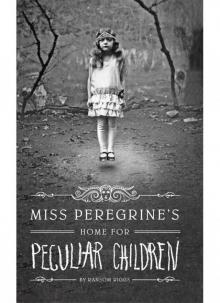 Miss Peregrine's Home for Peculiar Children
Miss Peregrine's Home for Peculiar Children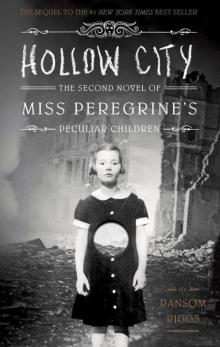 Hollow City
Hollow City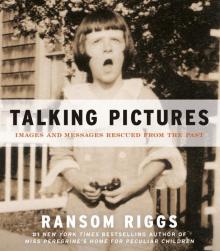 Talking Pictures: Images and Messages Rescued From the Past
Talking Pictures: Images and Messages Rescued From the Past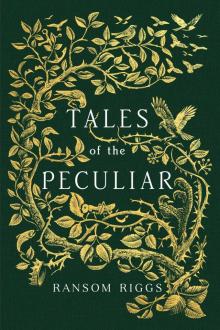 Tales of the Peculiar
Tales of the Peculiar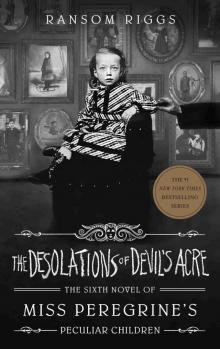 The Desolations of Devil's Acre
The Desolations of Devil's Acre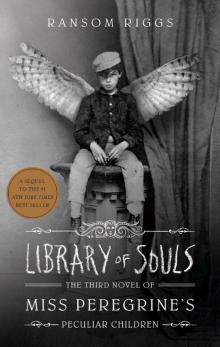 Library of Souls
Library of Souls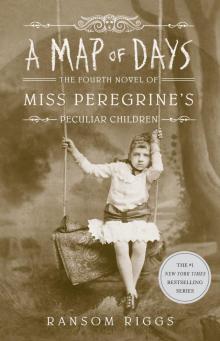 A Map of Days
A Map of Days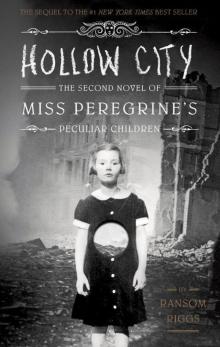 Hollow City: The Second Novel of Miss Peregrine's Peculiar Children
Hollow City: The Second Novel of Miss Peregrine's Peculiar Children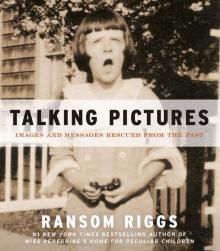 Talking Pictures
Talking Pictures